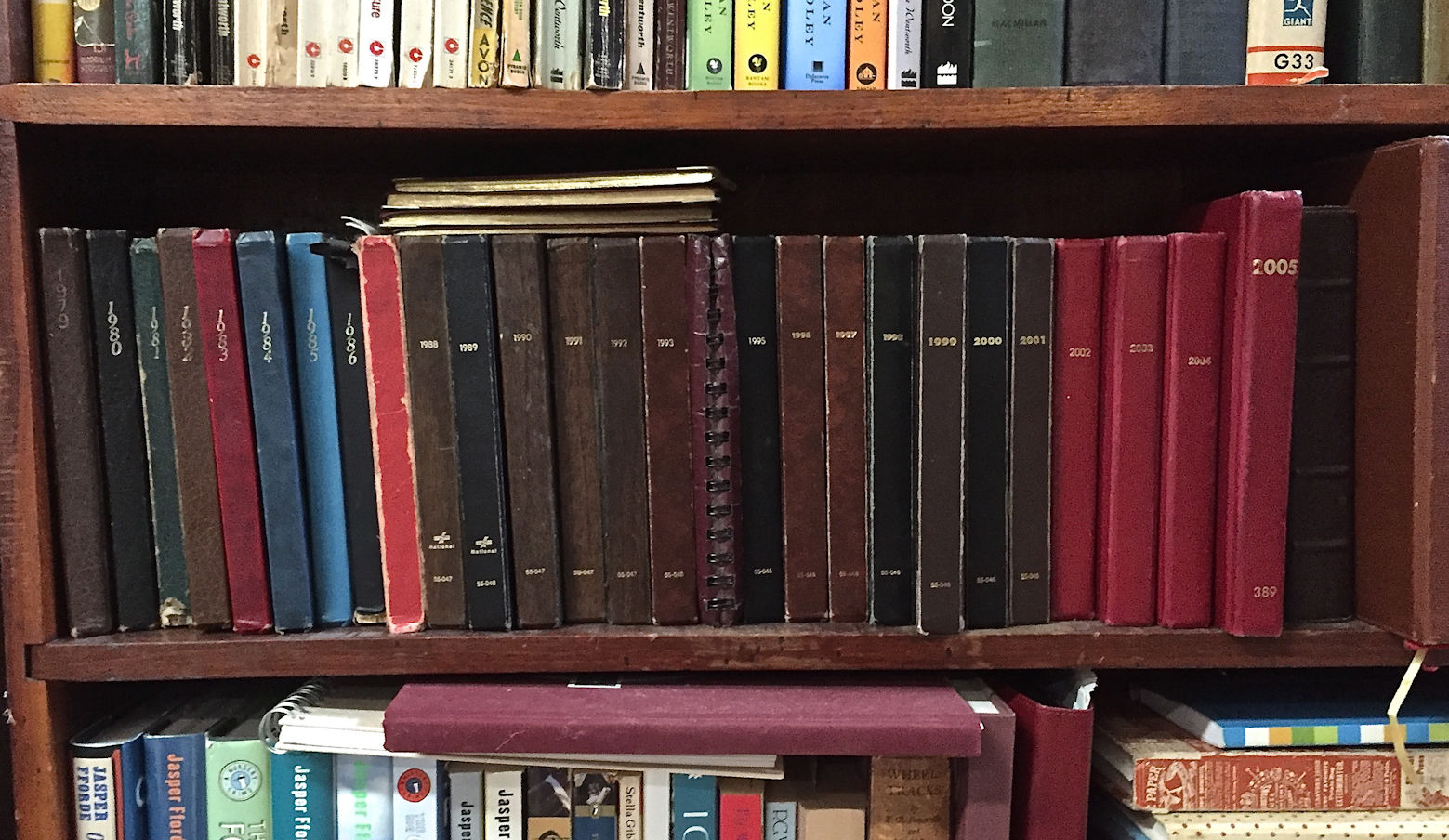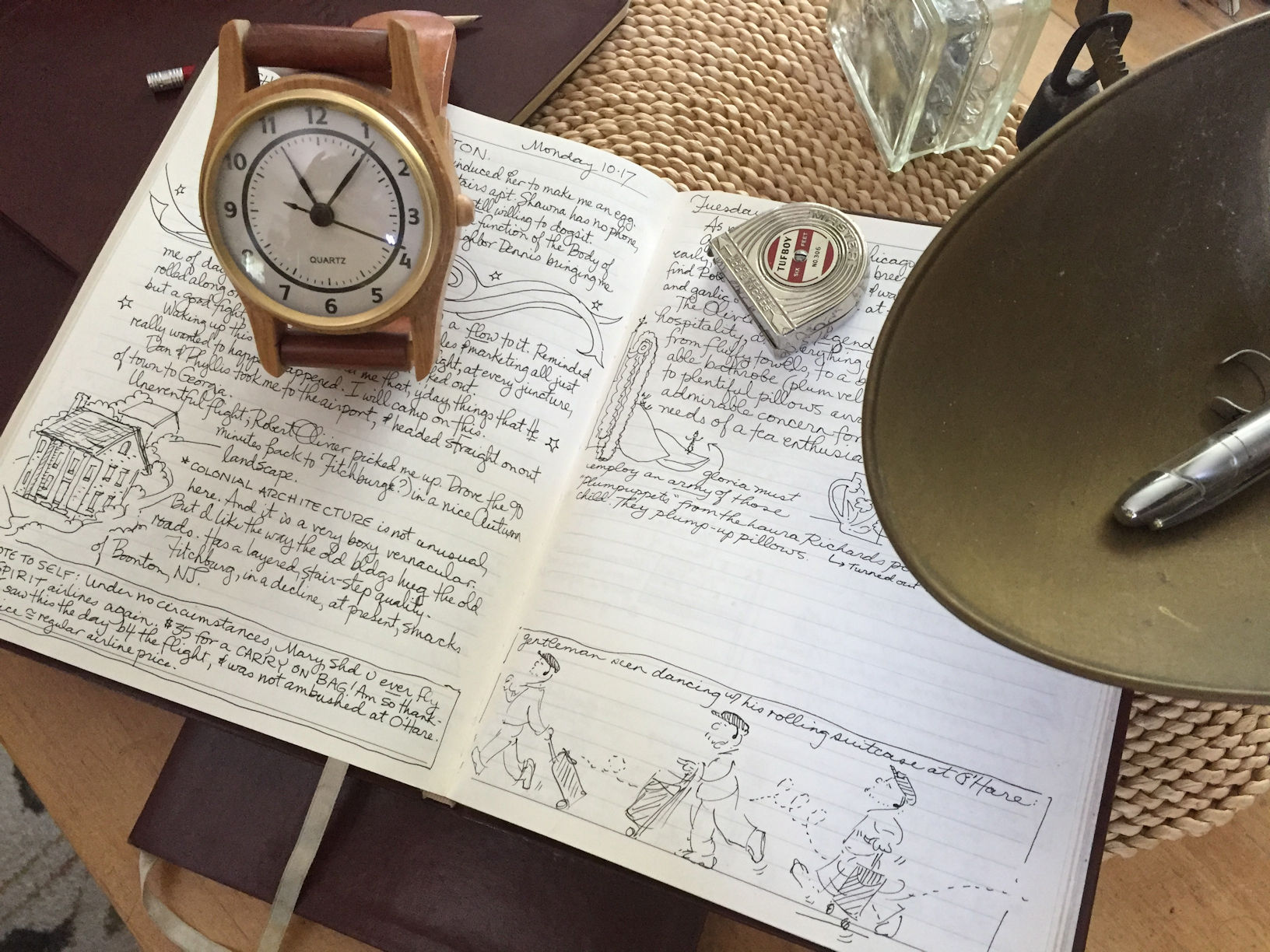





|




|
When I'm sketching ideas on those graph paper pages, I feel more creative, and the ideas just flow! |
|

"Habit is a cable; we weave a thread of it each day, and at last we cannot break it."
"A foolish consistency is the hobgoblin of little minds."
"If you can't say what you mean, you don't know what you mean."
Come January, I will have been keeping a journal for 38 years. Anything done for that long will shape you in fundamental ways. A consistent practice of flossing your teeth or biting your nails or sitting up straight or reading the Bible will, over years, wear grooves in your soul. (Ask anyone with an addiction or a collection.) Yet when I sat down to write this post, I found myself hard-pressed to catalog how journaling has affected me. I don't go back and re-read my journals, and heaven knows I can't find particular incidents in them unless the incident is attached to a birthday or holiday, so I reckon the effect of filling up all those dusty books in the basement is more to be reckoned in how I think, how I express myself, what I steer toward and away from.
Here are some things I noticed and/or remembered because I keep a journal:
Here are some particulars about how I do it:
___________________________________ I believe our minds are like pantries with slatted floors, and there are gaps between the slats. You can remember whatever you build shelves to hold in your particular mental pantry, and some of us have more natural storage capacity than others. Information for which there is no shelf falls through the cracks and is lost. (I can remember endless genealogies about '60s rock-n-roll bands, but very little of what my sons tell me about '90s indy-rock--no shelves for the latter exist in my brain.) I set out to keep a journal, I've always stated, because I didn't want my life to slip through the cracks. Journaling is shelf-building. Some people drain their daily feelings onto the pages of a diary, and I think that's valuable and therapeutic. It's just not how I've done it. I never wanted to fill up stacks of locked diaries with anguished outpourings, but I did want to remember my life. My journal is Sgt. Joe Friday style: "Just the facts, m'am." If I had to explain this, I'd say I've watched how I feel about things change over time like water rushing downstream, while facts held their places like the river rocks. Yet every day holds so many facts! I think I wanted to write down the details--PeggySue's built-in bookcases, the brushed-velvet feel of the pit bull puppy Danielle brought to class, John's spinach lasagna with the three packages of spinach in it. If I write down the details, I get to have all sorts of feelings about them when I revisit them. Remembering what I was like in my twenties and part of my thirties, I bless this instinct. Looking back over my journals, I see myself steer away from writing down the times when I thought I was a loser or a victim, sticking by some instinct to just what happened with a sprinkling of how I felt about it tossed on top of the events. I have, at times, struggled to believe I had much to contribute, but on the pages of journal after journal I see simply what I did, day after day. I made stuff, I cooked stuff, I said stuff. Lots of it was good stuff. Some, not so much. But the aggregate impression, when I look back at the pages across the gap of years, is that I showed up and did what I could to contribute. The record, in my own handwriting, silences the interior voice that would horribilize my life. I was not as successful at toning down my enthusiasms (early journals would repay me richly if there was a market for used exclamation marks). My tendency to end every incident with a doctrinal statement in those early years embarrasses and distresses me now, but is an accurate record of who I was. And when I was doing it--all the platitudinizing--I think the strain of trying to make the vast array of events fit into my religious boxes eventually set off mental alarms that steered me into deeper ways of thinking. The act of putting things into words tends to expose the holes in our logic and the places where we're coddling a comfortable falsehood. We build our world with our words. Who we end up being is shaped by the stories we tell ourselves about ourselves. Keeping a journal has shaped me, helped make me who I am today. It's helped me write my stories and edit my life.

|
Blog posts by category:
Art -
Storybook Neighborhood -
Books